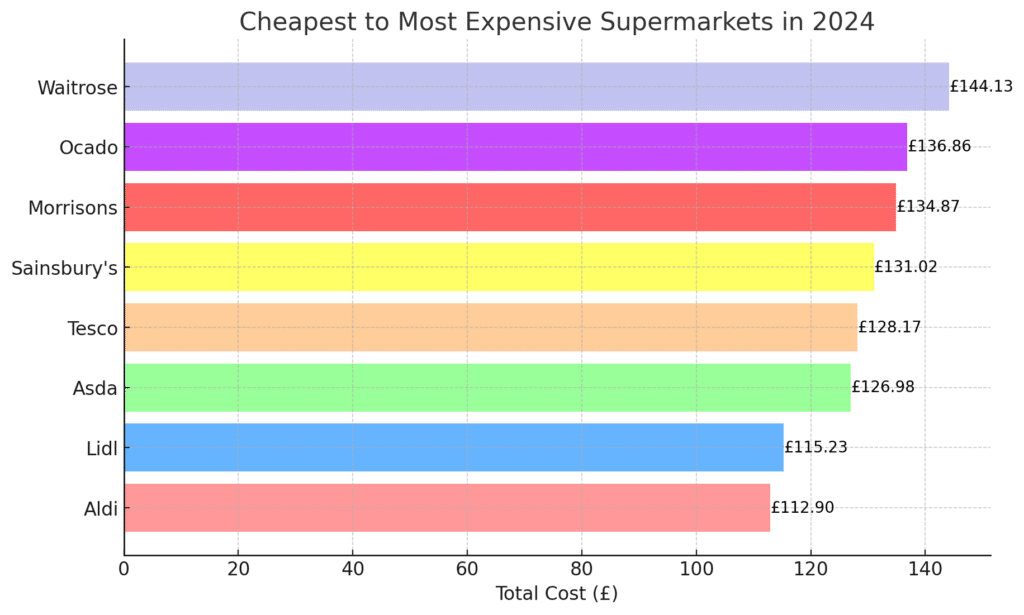
Grocery shopping is a necessary task for most households, but it can also be a significant expense. With a bit of planning and some savvy strategies, you can reduce your weekly grocery bill and save £1,000s each year, without compromising on the quality of your meals.
So, to help you get started, here’s a list of 15 practical ways to help you save money on your weekly shop.
1. Deals and discounts
One of the easiest ways to save money is by taking advantage of deals and discounts. Most supermarkets offer promotions that run weekly, discounts on bulk purchases, and loyalty programs that can help you save including Sainsbury’s Nectar and Tesco’s Clubcard. With these cards, you can bag yourself exclusive prices, collect points and save.
2. Avoid impulse buys
Impulse buys can quickly add up and derail your budget. Supermarkets are designed to encourage spontaneous purchases, with tempting items placed at eye level or near the checkout. To avoid falling into this trap, stick to your shopping list and resist the urge to grab unplanned items. If you see something you think you need, add it to your list for next time. This cooling-off period could help you determine if it’s something you need or something you want.
3. Don’t shop when you’re hungry
Shopping on an empty stomach can lead to poor decisions like spending money on items you may not need. When you’re hungry, you’re more likely to buy snacks and convenience foods that aren’t on your list. To avoid this, eat a meal or snack before you go shopping. This should help you stay focused on your list and make healthier, budget-friendly choices that your wallet will thank you for.
4. Shop around
Different supermarkets offer different prices, promotions, and product selections. Don’t be loyal to just one store – shop around to find the best deals. You might find that certain items are consistently cheaper at one supermarket than another. By being flexible and willing to visit multiple stores, you can take advantage of the best prices.
In May this year, Which? checked the prices of 67 popular groceries at eight of the UK’s biggest supermarkets. These items included essentials such as milk and cheese.
They compiled the total cost of these items to determine the average price at each supermarket. According to their analysis, Aldi was crowned the cheapest supermarket with a total average cost of £112.90, while Waitrose was the most expensive at £144.13.

5. Stick to a list
One of the most effective ways to save money is by writing a shopping list before going to the supermarket. A list helps you stay organised, reduces the time spent in the store, and minimises the risk of buying unnecessary items. Look at the ingredients you already have at home and plan your meals for the week to ensure you’re only buying what you need.
6. Don’t shop pre-packaged
Pre-packaged foods, such as chopped vegetables, pre-cooked meals, and individually wrapped snacks, often come at a premium.
- For example, a 400g pack of carrot batons costs 79p, whereas a 500g bag of carrots costs 33p.
While they might be convenient, they can increase your grocery bill. Instead, buy whole fruits and vegetables, and prepare them yourself. Not only will you save money, but the veggies may even last longer and you’ll also reduce packaging waste.
7. Look in your cupboard first
Before making your shopping list, check your cupboards, fridge and freezer to see what you already have. You might find that you have ingredients for a few meals already on hand. This can help you avoid buying duplicates and reduce food waste. Add these items into your meal plan to make the most of what you already have.
8. Use a zero waste recipe generator
SuperCook is a zero waste recipe generator which lets you enter a list of ingredients and then gives you a load of recipes, preventing your food from going to waste. Just by entering chicken, bacon, cheddar, mushrooms, garlic and onion, the generator managed to share recipes for over 400 dishes. You may also find Tesco’s recipe finder useful.
9. Avoid snack size
Snack-sized packages of crisps, cookies, and other treats are convenient but often come with a higher price per unit compared to buying in bulk.
- For example, Tesco Sweet & Salted Popcorn (110g) costs 99p, whereas Tesco Sweet & Salted individual bags (6x14g) will set you back £1.50. Meaning, if you buy the snack size bags, you’ll be paying 51p extra and getting 26g less.
10. Head to the reduced section
Make your way to the reduced section when you first get to the supermarket to see if any items on your list have a lucky yellow sticker on them. A lot of ingredients can be frozen if you don’t need them immediately – but always double-check on the packaging first. Reduction times vary between different stores but the first reductions tend to take place mid-morning and the biggest reductions begin early evening.
11. Don’t pay for convenience
Convenience foods, such as ready-made meals and pre-cooked ingredients, are usually quite pricey. While they can save time, they often cost significantly more. If you prepare your meals at home and freeze them so they’re ready to take out during the week, you’ll probably end up saving a whole load of time and money. You’ll likely find that homemade meals are tastier and more nutritious.
12. Do your homework
Researching prices and products before you shop can help you make informed decisions. Compare prices and different supermarkets and look for generic or store-brand alternatives, which are often just as good as name-brand products but much cheaper. Use apps and websites that provide price comparisons such as the Google Shopping tool to maximise your savings.
13. Buy in bulk
Purchasing items in bulk can lead to big savings, especially for non-perishable goods like rice, pasta, and canned foods. While the upfront cost might be higher, the cost per unit is usually lower, saving you money in the long run. Be sure to store bulk items properly to prevent spoilage.
14. Shop seasonally
Buying fruits and vegetables that are in season is typically cheaper and fresher. Seasonal produce is often on sale and tastes better because it’s at its peak ripeness. Learn what’s in season in your area and plan your meals around those items. This not only saves money but also supports local farmers and reduces the carbon footprint associated with transporting out-of-season produce.
15. Use coupons wisely
Coupons can be a great way to save money, but only if used wisely. Don’t buy something just because you have a coupon for it. Instead, use coupons for items you already plan to buy. Combine coupons with sales for even greater savings. Keep an eye on expiration dates and organise your coupons so they are easy to use when you shop.
Saving money on your weekly grocery shop doesn’t have to be difficult. By implementing these 15 strategies, you can make a significant impact on your grocery bill while still enjoying delicious and nutritious meals. From taking advantage of deals and discounts to avoiding impulse buys, there are numerous ways to stretch your budget without sacrificing quality.

To discover more about how to manage your debt and to receive free debt advice, you can visit www.moneyhelper.org.uk.

